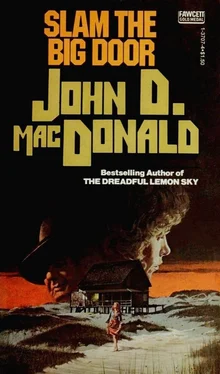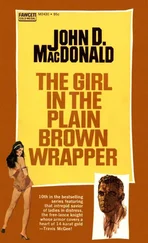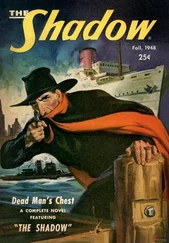John MacDonald - Slam the Big Door
Здесь есть возможность читать онлайн «John MacDonald - Slam the Big Door» весь текст электронной книги совершенно бесплатно (целиком полную версию без сокращений). В некоторых случаях можно слушать аудио, скачать через торрент в формате fb2 и присутствует краткое содержание. Город: Greenwich, Год выпуска: 1960, ISBN: 1960, Издательство: Fawcett Gold Medal, Жанр: Современная проза, на английском языке. Описание произведения, (предисловие) а так же отзывы посетителей доступны на портале библиотеки ЛибКат.
- Название:Slam the Big Door
- Автор:
- Издательство:Fawcett Gold Medal
- Жанр:
- Год:1960
- Город:Greenwich
- ISBN:978-0-449-13707-9
- Рейтинг книги:3 / 5. Голосов: 1
-
Избранное:Добавить в избранное
- Отзывы:
-
Ваша оценка:
- 60
- 1
- 2
- 3
- 4
- 5
Slam the Big Door: краткое содержание, описание и аннотация
Предлагаем к чтению аннотацию, описание, краткое содержание или предисловие (зависит от того, что написал сам автор книги «Slam the Big Door»). Если вы не нашли необходимую информацию о книге — напишите в комментариях, мы постараемся отыскать её.
Before the story is done, the pulse has run wild...
Slam the Big Door — читать онлайн бесплатно полную книгу (весь текст) целиком
Ниже представлен текст книги, разбитый по страницам. Система сохранения места последней прочитанной страницы, позволяет с удобством читать онлайн бесплатно книгу «Slam the Big Door», без необходимости каждый раз заново искать на чём Вы остановились. Поставьте закладку, и сможете в любой момент перейти на страницу, на которой закончили чтение.
Интервал:
Закладка:
“I guess I’ve got a lot on my mind.”
“All of it none of my business, eh?”
“Relax, Mike. You’re down here to relax. Soak up the sun. Have some laughs. Get drunk. But stay off my back.”
“You’ve got bad nerves, Troy. Worse than mine.”
“There isn’t any rule says you’ve got to know everything about everything.”
“With me it’s a habit. Like finding out this big Horseshoe Pass Estates of yours is sour.”
Troy stared at him. “Who says so!”
“Nobody did. It was a shot in the dark. You just confirmed it, boy.”
“Maybe a week is long enough. Maybe that’s all the rest you needed.”
“I’ll stick around awhile, thanks.”
“Goddamn it, Mike!”
“Let’s drop it. When you get off this remote kick you’re on, and realize I might have some ideas — maybe even good ideas — about what’s chewing on you, look me up. I’ll probably be on the beach. Let’s drop it for now. Brief me on that pair over there.”
Troy scowled at him for a few seconds, and then shrugged. “That’s the Claytons. Rex and Tracey.”
“A very loving couple.”
“He loves her and she loves anybody. I got to go find some aspirin.”
During the next hour Mike had some dull talk with some dull people. When he was free he built a third drink and took it back to his pleasant guest room. He stretched out on the bed and thought about Troy. Friendship was one of the great variables. Like everybody is in their own little rowboat, with no oars, and the currents move you around. With some people it’s worth paddling with your hands to keep the rowboats side by side. With others neither of you have to work because you’re caught in the same current anyway. It had been like that with Troy. And he suspected it still was, if Troy would stop being remote. With Troy it wasn’t like other interrupted friendships — where you get back together again with great expectations and find out you’re a couple of strangers. Either you grew in different directions, or one stood still and the other one grew.
He was cynic enough to know that Troy could never entirely forgive him for that New York mess. Nobody can conquer all the subconscious resentment against a man who sees him at his hopeless, helpless worst, and drives off the dogs and gets him back on his feet.
He remembered how it was in New York. New York had to be put into historical perspective, because it was a part of a lot of things that had gone before.
After the war Mike had tried to continue with the column. It meant good money. But a lot of things went wrong. The syndicate was small and couldn’t afford to invest in a promotion to make Mike Rodenska a peacetime success. The bookings began to dwindle. A bunch of the best wartime columns were published in book form, and didn’t sell enough to make the advance. And the labor of tapping out the columns had become more than labor. It was misery. Mauldin and Hargrove were having the same problem — and probably Pyle wouldn’t have found it too easy either had he managed to miss his rendezvous on Iwo Jima. Actually Mike hungered to be back as a member of the working press. Doing a column seemed too remote — almost phony. Buttons wanted him to do what would make him happiest.
And so, by the middle of 1946, Mike and Buttons and Micky and Tommy moved into an elderly rented house in West Hudson, unpacked the cartons with gypsy efficiency, and Mike went to work at Guild minimum for the ancient, honorable and somewhat self-important West Hudson Leader , covering City Hall, County Courthouse and police, doing assigned Sunday features and a three-a-week op-ed column on purely local matters, happy as a flea on a large hairy dog.
Three months later, quite by accident, he heard of a good opening in the largest local advertising agency, and on a hunch he wrote to Troy in Rochester, then tore up the letter and phoned him. For Troy it had come at exactly the right time. Troy was getting very tired of taking directions from a very young and very stupid man who happened to be the only son of the senior partner in the Rochester agency. And he was getting fed up with most of his pregnant Bonita’s Rochester relatives.
Two weeks later Troy and Bunny were installed in a pleasant apartment Buttons had found for them. The first little girl, Lycia, was born on Christmas day, 1946, and the second Jamison baby, Cindy, was born on New Year’s Day, 1948.
Those were the best years, Mike recalled. Buttons and Bunny got along perfectly. They were both smallish, talkative, excitable women, Bunny as dark as Buttons was blond. The four of them spent a lot of time together. And had fun. But to Troy, fun was secondary during those years. He had a lot of drive and intensity, taste and talent and a kind of ruthlessness that was too veiled to be disturbing. Mike remembered how Troy had said, “I want more than my share.”
There was an inevitability about the way he went after it. And an inevitability about the way his work eventually came to the attention of one of the big New York agencies. Both wives wept when the Jamisons moved on to New York, toward Troy’s big golden future.
Mike well remembered a curious thing that happened about a week after Troy and Bunny and Lycia and the baby were gone. He had been in the kitchen, talking to Buttons. And he had said, casually, and perhaps with a little twinge of envy, “Here you are stuck with a newspaper bum, while Bunny gets to lead the fat life.”
Without warning, and only half playfully, Buttons had given him a smack in the chops that made his eyes water and shocked him. “Don’t you ever say that! You’re worth — fifty of Troy Jamison!”
“Hey! I thought you liked the guy.”
“I do, I guess. But he’s weak.”
“Weak? Troy? I don’t understand...”
“He’s pressing too hard, darling. He’s pushing too hard, without really knowing what he wants. And when he starts to get what he’s after, and finds out it isn’t as important as he thought, something is going to give. He’s going to come apart. Bunny is going to be hurt, and maybe you’ll be hurt too, if I let you get dragged into it.”
“But he...”
She had come sweetly into his arms. “Hey, I busted you a good one. It left marks.”
“I’ll get you a bout in the Garden with Sugar Ray.”
“I love you, Mike, and don’t let me ever hear that kind of talk about the fat life. We live that fat life, honey. I couldn’t imagine being married to anybody but you.”
He had thought her wrong, about Troy. But four years later, in 1953, when he was thirty-four, that clever, promising, driving, and demonstrably courageous young man, Troy Jamison, a thirty-five-thousand-dollar-a-year man with Kelfer, Sorensen and Ryan, owner of a lot of house in Larchmont and a pocketful of credit cards, blew up in everybody’s face. And they were astonished.
Bunny had phoned Buttons long-distance, incoherent with tears, pleading for help. So Mike had taken time off — by then he was assistant to the managing editor, a promotion that had come about when he had gotten wistful about the Korea thing. They had stashed the boys with a close friend and neighbor and had driven down through soiled sleet to Larchmont, to a big house and a soul-sick woman who bore the bruises of the cruel and drunken beating she had been given, and a situation beyond repair. Bonita Jamison was under control, long enough to give them the facts. It had taken three months for it to go entirely sour — starting with a restlessness on Troy’s part, a compulsion to make savage comments to their friends, a growing indifference to both her and the children. Apparently things were still all right at the agency. But their personal life had gone to hell. There was a woman in the city, from all reports a cheap, amoral type named Jerranna Rowley. Troy had a hotel room, but most of the time he was living with the Rowley woman. He had made no secret of the relationship — in fact he used it as a club. Bunny was sorry she had bothered them. She was going to leave the girls with her people in Rochester and get a Nevada divorce. It was all over. She said there was no point in Mike going into the city to talk to Troy. It had ended.
Читать дальшеИнтервал:
Закладка:
Похожие книги на «Slam the Big Door»
Представляем Вашему вниманию похожие книги на «Slam the Big Door» списком для выбора. Мы отобрали схожую по названию и смыслу литературу в надежде предоставить читателям больше вариантов отыскать новые, интересные, ещё непрочитанные произведения.
Обсуждение, отзывы о книге «Slam the Big Door» и просто собственные мнения читателей. Оставьте ваши комментарии, напишите, что Вы думаете о произведении, его смысле или главных героях. Укажите что конкретно понравилось, а что нет, и почему Вы так считаете.












